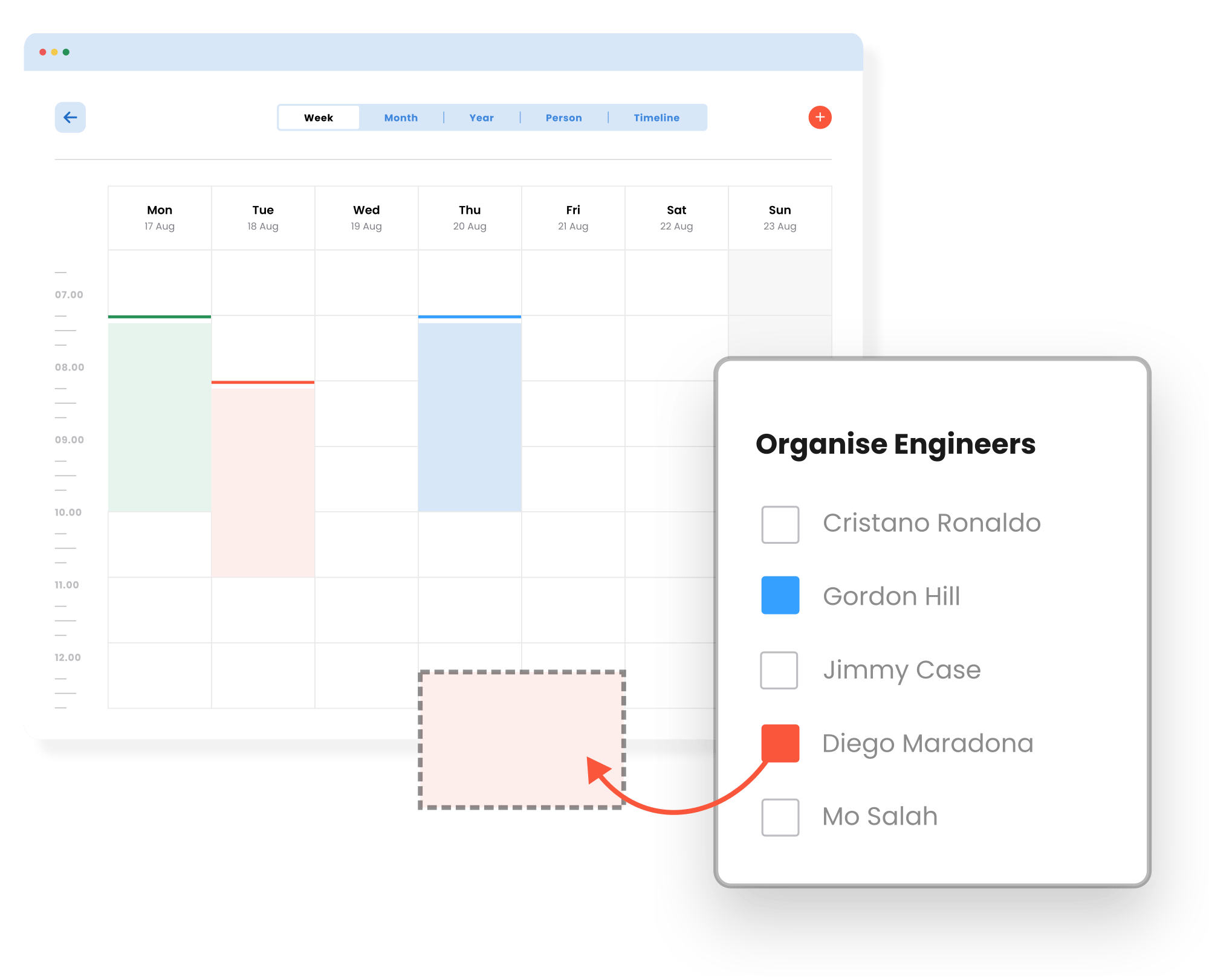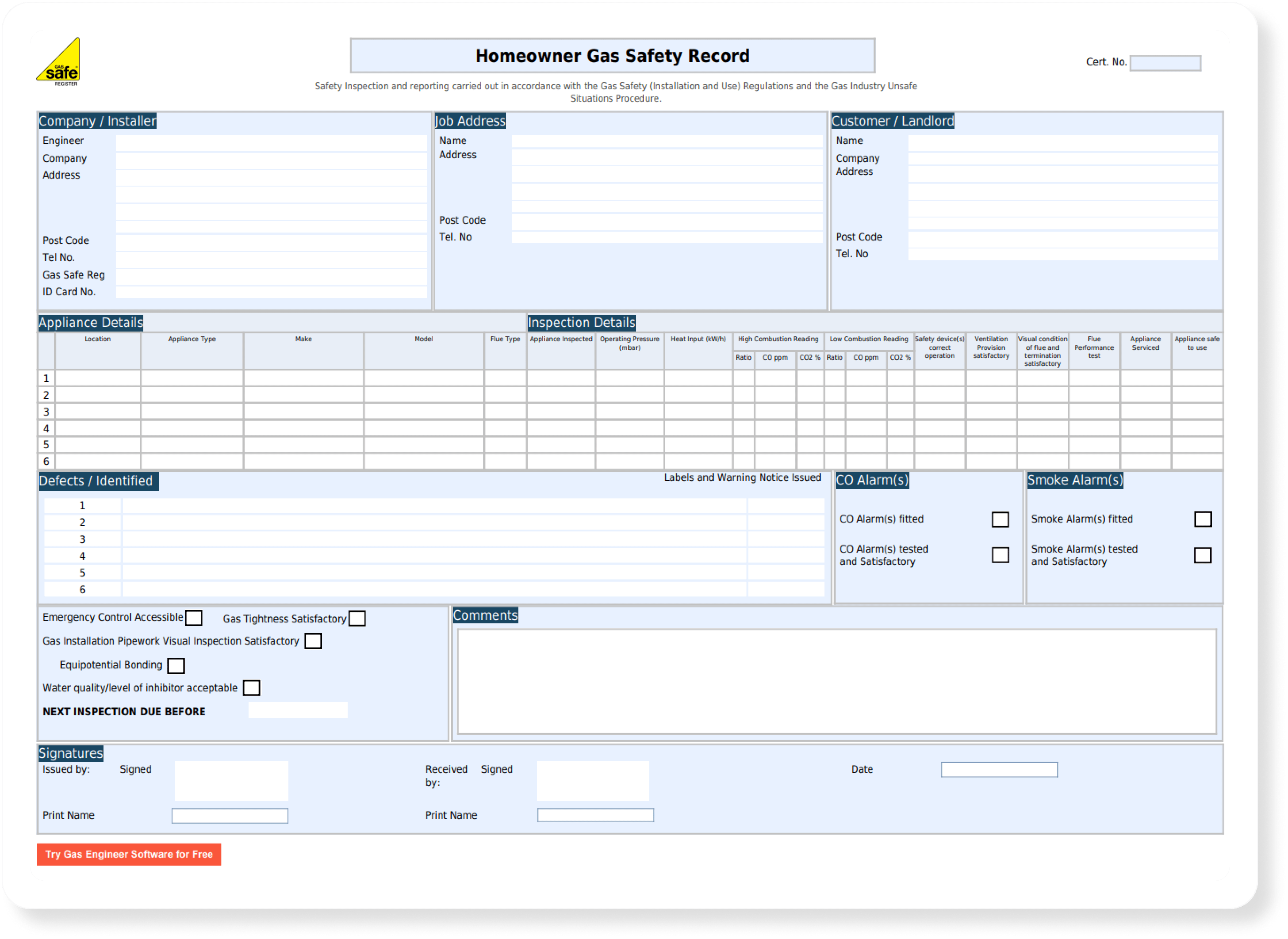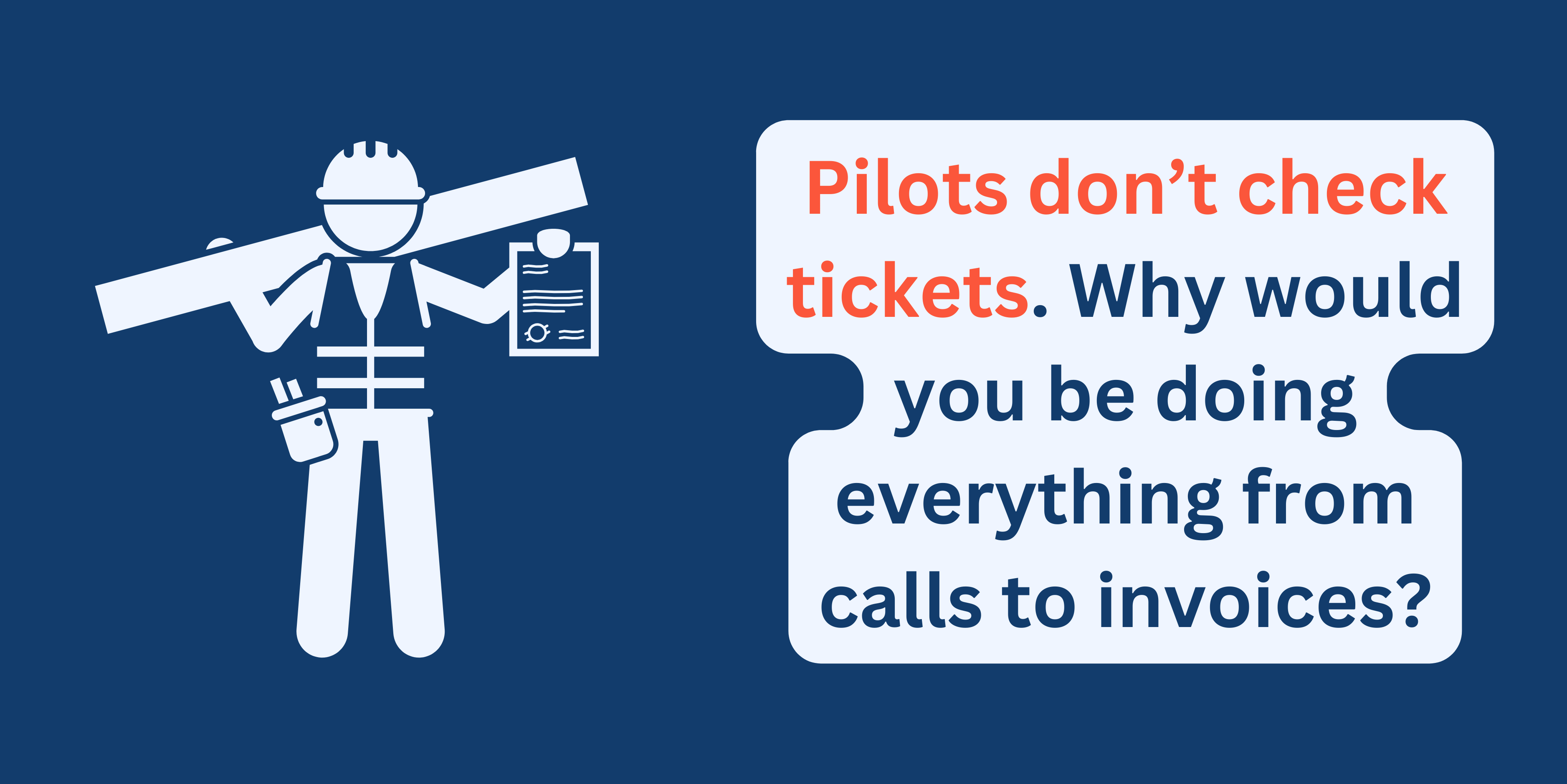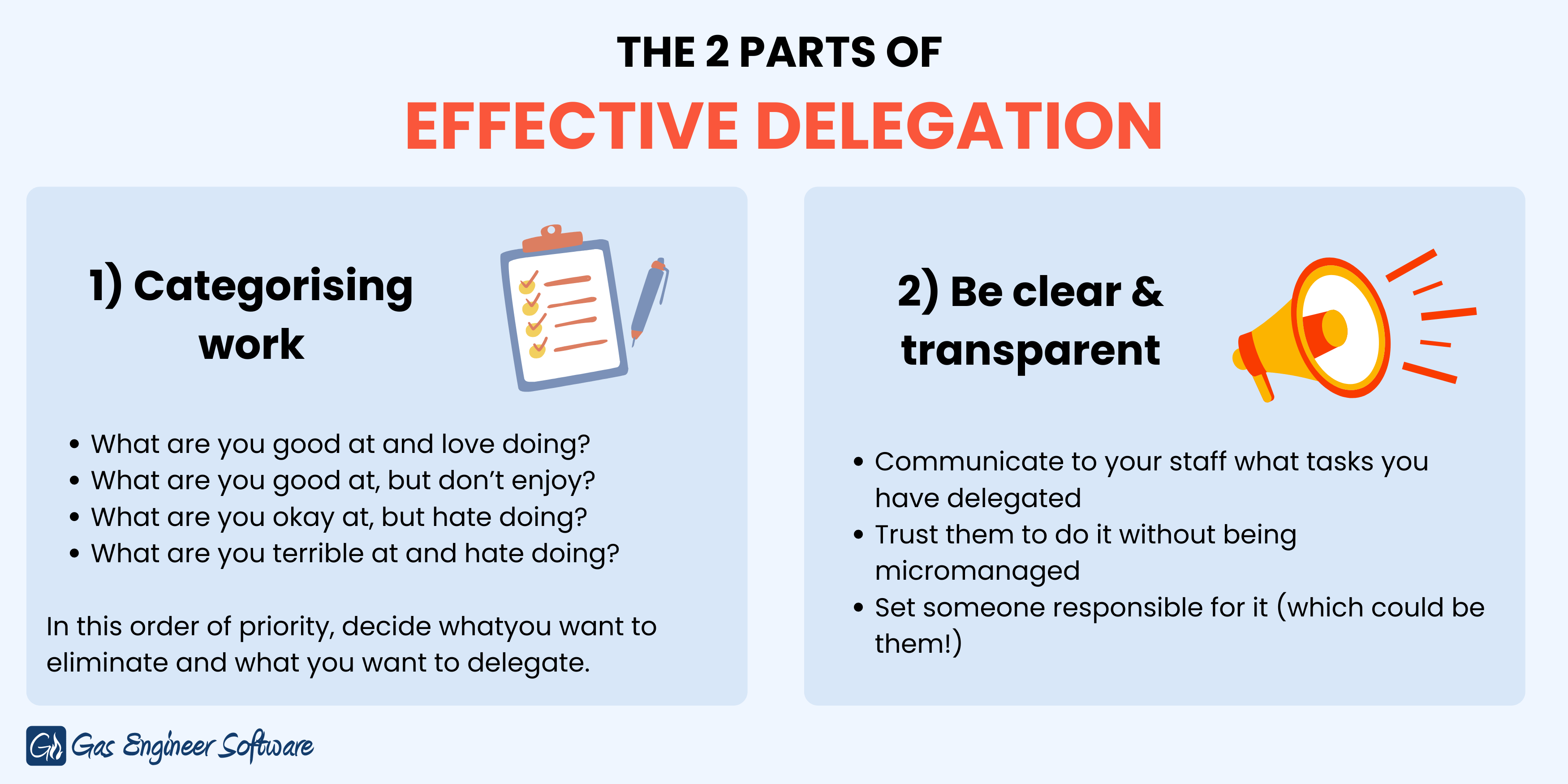Delegation: A Business Owner’s Mindset
![[Featured Image] Delegation](https://gasengineersoftware.co.uk/wp-content/uploads/2024/05/Featured-Image-Delegation.png)
Delegation is one of the most important parts of growing a business. But as you hire more employees, you’ll soon realise that each one takes up a good chunk of your time (roughly 10%).
Once you get 4-5 employees, this quickly adds up with about half your time spent just managing people. If you’re still trying to do all this other day-to-day work you’re used to doing… well, you’re going to end up working well into your evenings and weekends without anywhere to retreat from the constant stress of it all.
Eventually, there will come a point where you think to yourself:
“I can’t hire anyone else because I simply don’t have the time to manage them”.
This is a ceiling that most heating businesses meet. But in truth, it’s because their owners aren’t delegating enough of their work (or even at all).
If you want to grow your business, your goal should be to become a leader who coaches employees and delegates work. If you don’t, you end up becoming what’s known as a ‘transactional leader’ who creates an environment in which employees and the business get stuck.
Thinking about hiring a new employee? Click here for 5 tips that will help you find the right person.
Why is all this important?
If you’re not delegating work properly and become a transactional leader, you’re always going to be the one answering questions.
This is because you’re effectively teaching your employees to come to you when they have a problem expecting an answer rather than trying to find a solution themselves.
For a small team where you want control, this might work. But as you grow it quickly becomes unsustainable and incredibly draining.
Most business owners that try and work this way get burnt out, frustrated, and suffer from high staff turnover.
Most business owners that avoid delegating get burnt out, frustrated, and have high staff turnover.
When do you know you’ve hit a ceiling?
The short answer is when your business stops growing, or you find yourself trying to juggle far too many things at once.
It’s natural to be hesitant about delegating your work, especially when you’ve grown a business from the ground up – it can feel almost like a child, and you don’t want to let go.
Part of this is because when you first start, you’re the one doing everything. As a sole trader, you know your businesses better than anyone, and it takes your direction and vision.
Many fall into the trap of thinking they can do everything better. In reality, hiring employees who specialise in admin work or a particular type of job, for example, will do a much better job than anyone else – especially an overworked and overstressed business owner.
There’s a reason why pilots don’t do repairs on engines or check your tickets at the gate. So why would you be handling everything from the actual jobs to customer calls to booking jobs, and filing paperwork?
What do you want for your business?
You’ll need to make a conscious choice at some point. Do you want to keep your business stable and small, or do you want to make it big?
Both are valid choices – we can’t stress this enough.
But if you do decide you want to build something, you’ll find it also involves personal growth: including learning how to delegate effectively.
Tradespeople that have grown large businesses spend less time on the tools and more on strategy, planning, HR, management, and building systems. To do this, they’ve got to learn to trust their employees. But the other side of this is that they create a business which can look after them.
So, how do you master the art of delegation?
Part #1: Categorise your work
The first thing to do is write a list of all the tasks you do at the moment, and put them into 4 categories.
- Things you’re good at and love doing
- Things you’re good at, but don’t enjoy
- Things you’re okay at, but hate doing
- Things you’re terrible at and hate doing
This list will help you instantly see which tasks you should delegate, starting from the bottom up.
The type of work at the bottom of the list ends up using up a disproportionate amount of your energy. You’ll procrastinate doing it, spend longer than it needs, and probably not do a good job anyway. For most tradespeople, this kind of work is tax returns, data entry, and customer communication – but everyone’s different.
The solution here is simple: either delegate or eliminate.
Part #2: Be clear & transparent
With your list, you should know exactly what you want to start delegating. The most important thing now is to be clear and transparent. People aren’t mindreaders, and will do their best work when they clearly understand their role.
Delegation has 3 stages:
- Explain
- Trust
- Verify
You’ll need to communicate to your staff what tasks you have delegated, trust them to do it, and set someone responsible for it (which could be them!)
For example, you may explain to an engineer that they need to report all upsells back to a member of your admin team to properly record and document. You’ll then trust them to do this without micromanaging, and delegate to the admin staff to verify that this has taken place based on invoice records.
Part of this also comes down to the hiring process. If you’re clear and write down exactly what you’re looking for – rather than something generic from ChatGPT – you’ll repel those that don’t fit the role and attract those that do.
This will help you place trust in them and get better results from your team.
Helping your new hire settle in

Delegation not only makes growing a larger business possible, but also far less stressful and time consuming. You won’t burn out, you’ll get to enjoy your life, and you’ll be able to give back to your team by helping them grow.
But effective delegation needs a reliable and streamlined workflow to back it up.
Gas Engineer Software is a fully-integrated job management solution that can handle everything from quoting to paperless certificates, invoices, schedules, and lots more. Hiring new staff and delegating work to them is quick and easy when you run your business through an all-in-one, efficient, and easy-to-use job management system.
Next steps:
If you’ve been thinking about implementing software into your workflow to save time, here’s what you can do next:
- Visit our resources centre where you'll find more articles like this one and our free gas rate calculator.
- Start a free trial to see exactly how our software works for your business.
- Watch our video demo to get an idea of how our software works. You can also book a 1-on-1 session with our customer success team for a more personalised experience.
- Know an engineer who's still using paper? Help them and us out by sending our software their way!



